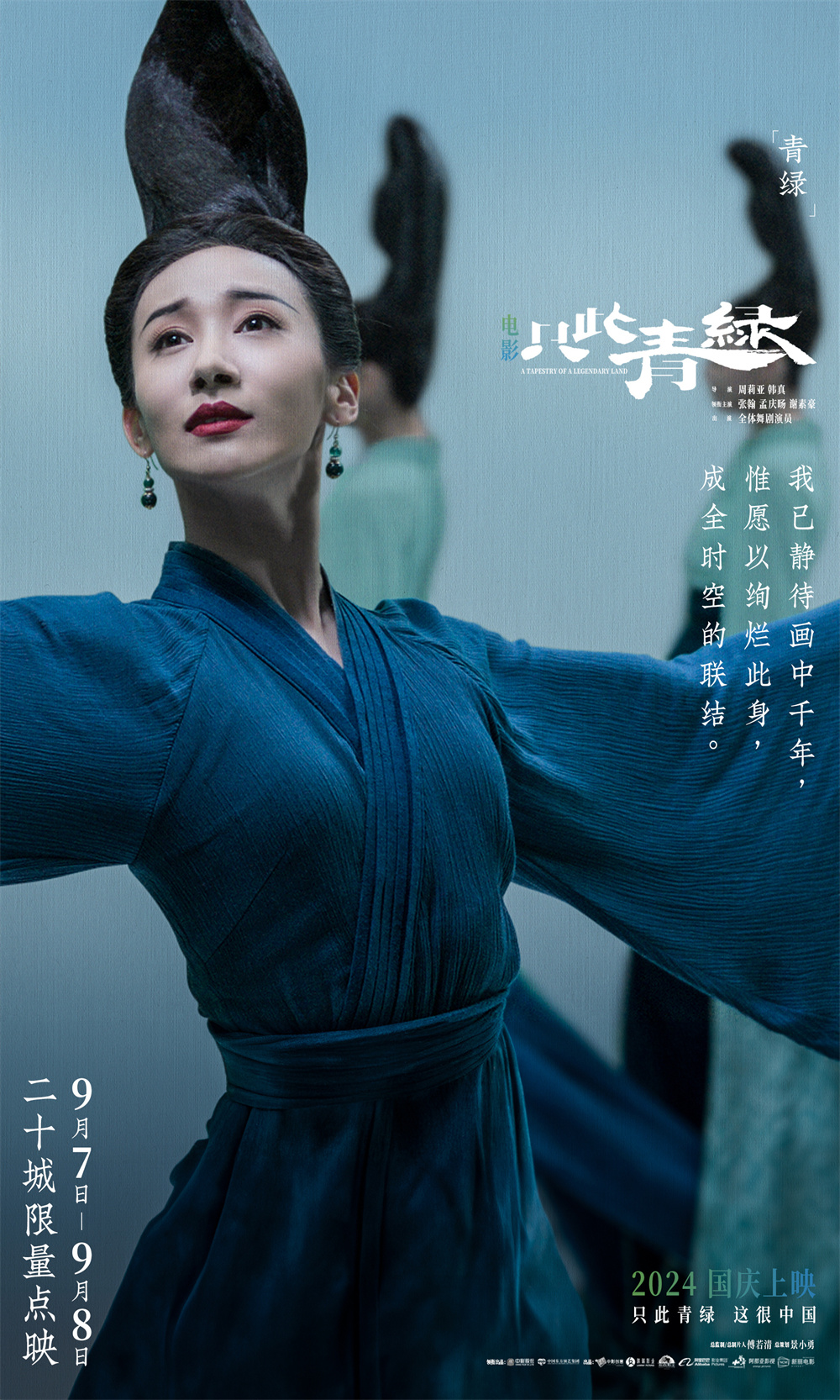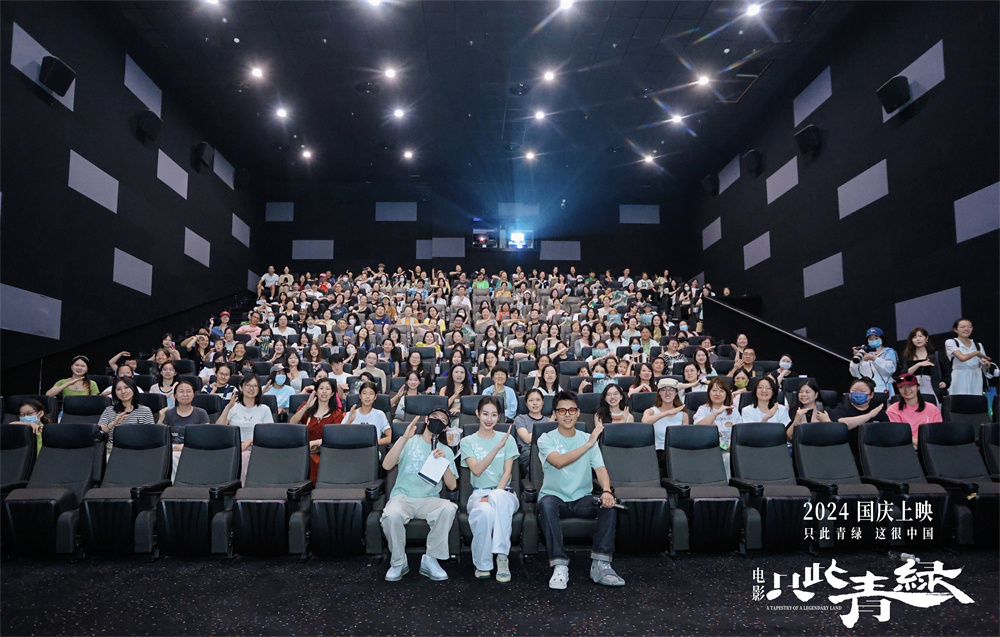
The film adaptation of the dance drama of the same name, "Just This Green," is set to hit theaters for a limited preview in twenty cities this weekend (September 7-8) as part of the National Day release. The original creative team will collaborate with top filmmakers, inviting audiences to "step into the painting." On September 7, starring actors Zhang Han, Meng Qingyang, and Liu Yang participated in a session to interact with viewers.

Creative team group photo
The film "Just This Green" is based on the eponymous dance drama and tells the story through the eyes of a modern Palace Museum artifact restorer, guiding viewers back to the Song dynasty. From the perspective of the Northern Song painter Wang Ximeng (played by Zhang Han), audiences enter the world of the legendary painting "A Thousand Li of Rivers and Mountains." The unfolding scenes depict the stories behind the vast canvas, using dance to illustrate the era of the Song dynasty while connecting generations of artisans’ spirit and the cultural heritage that spans thousands of years.
While the painting "A Thousand Li of Rivers and Mountains" has enjoyed enduring fame, its creator, Wang Ximeng, remains relatively unknown, with only scant mentions in historical records: At the age of eighteen, Ximeng was summoned from his painting school to the imperial library. He presented paintings, but his skills were still developing. Recognizing his teachable nature, he was guided personally by his mentors and, within six months, presented this remarkable work. "In the drama, Wang Ximeng repeatedly presents his painting, almost as if he is a part of it. This reflects the pain and stubbornness of a talented youth who is not recognized, which is a lesser-known essence behind this masterpiece," Zhang Han shared. He also emphasized the patriotism intertwined within the character's journey: "In a perilous dynasty and turbulent times, to still wish to depict the grandeur of Song’s landscapes shows a desire for eternal stability—a beautiful vision in itself."

Zhang Han as Wang Ximeng
During the post-screening discussion, the three dancers spoke about their transition from stage to screen and from dancers to film actors. Liu Yang shared the novel experiences encountered during filming. Having never filmed a movie before, he experienced discomfort while suspended on wires and would feel nauseous each time he descended. Afterward, he would often feel dizzy, making it hard to focus on the director’s instructions. Additionally, to meet the demands of close-up shots, the makeup design was meticulous. Upon opening the makeup room door, the variety of props was dazzling, and the makeup artists dedicated over five hours to refine the details, capturing the wrinkles that reflect age on-screen. "It’s rare for someone to compliment that my skin looks youthful regardless of makeup, making for a memorable experience," Liu Yang joked, "but seeing the final outcome on film made it all worth it, even if I had to be nauseous a hundred times."

Liu Yang as the Stone Grinder
Meng Qingyang, who played the character Qinglu, also shared her understanding of her role, describing "Qinglu" as more than just a character—it serves as a bridge connecting the artifact restorer and Wang Ximeng, as well as Chinese traditional culture. She felt that dancers were relatively unfamiliar with the filming process, especially in terms of intimate shots. Under the lens, every physical gesture, expression, and even the tiniest details, such as pores, are magnified. The significant difference lies in how space is perceived and enjoyed in a stage drama versus a film: “In theater, much of the experience relies on lighting, dancers, costumes, and makeup, while the stage leaves vast white spaces for audiences to fill in their imaginations. The film is far more concrete, where every detail can be amplified or accentuated and presented more directly to the viewers. This presents us with a bold challenge and breakthrough; we hope more people will understand the dance drama industry and know our traditional culture, all contributing to painting our own 'A Thousand Li of Rivers and Mountains.'"

Meng Qingyang as Qinglu
When asked if the scene involving eating a pancake was improvised, Zhang Han chuckled, “Eating the pancake is a fixed part of the performance. Across 600 stage shows, I eat every time. However, each time I do it in a different way. The climate changes, the settings differ, audience reactions vary, the volume of the music is inconsistent, and my physical condition varies too. All these factors create different emotions and sensations. Immersing myself in the character and finding the most authentic state through actions like eating pancakes or getting onto a boat is why many audiences wish to watch multiple times.”
Zhang Han noted that a stage production can host over 2,000 viewers at once, while films can reach audiences nationwide and even worldwide without the need for the actors to be present, allowing many to experience the charm of traditional Chinese culture. He believes that different viewers—indeed even the same viewer at various ages—will have distinct experiences, which is also part of cultural legacy. Zhang Han hopes "Just This Green" will help make Wang Ximeng's name and story more widely known and allow more people to appreciate the allure of traditional Chinese culture.
The movie "Just This Green" is set to be released nationwide on October 1.

Creators with audience photo


